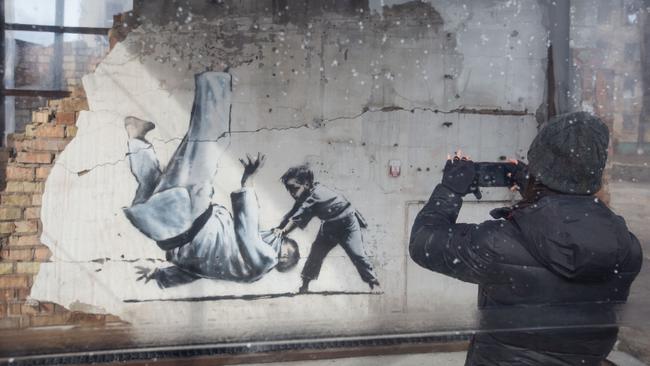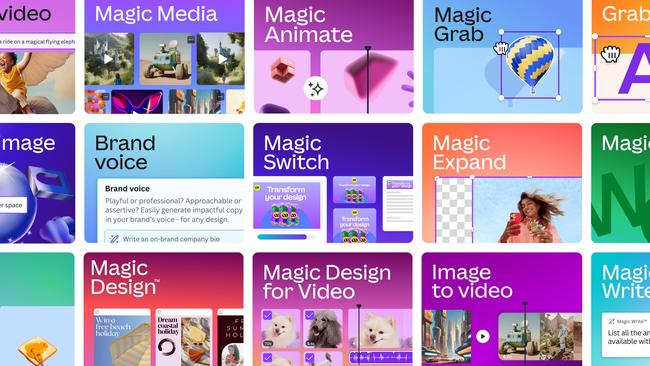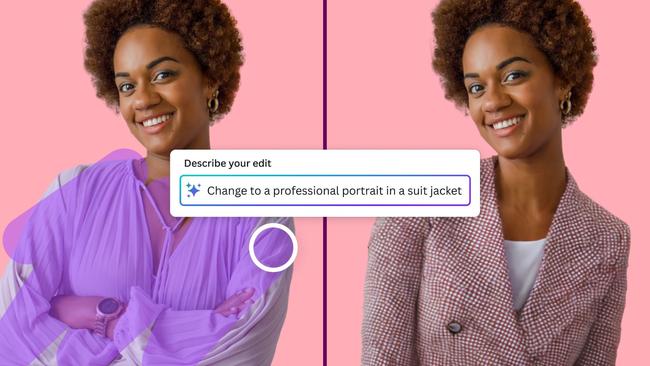Canva is preventing its AI engine from channelling its inner Banksy
Banksy is among the list of 5000 well-known artists Canva has compiled to block users from recreating AI artworks with its latest tools in a bid to avoid law suits.

Canva has compiled a list of more than 5000 well-known artists – including Banksy – which users will not be able to use to generate similar artworks, in a bid to avoid lawsuits and protect artists.
Users will be prevented from asking Canva’s new Magic Studio – a suite of tools which use AI to generate presentations, video and imagery – to create works in the style of Banksy or remake an artist’s work.
The Australian technology giant has collated the list of artists from data in open source libraries across the internet, Canva head of AI Danny Wu says.
“One of the mitigations that we have adopted is we have actually identified and loaded thousands of well-known artists and creators and we have made it so that our technology declines to generate posts (like theirs),” he said.
The strategy comes as companies with generative AI products navigate complex legal and copyright concerns.
There have been legal disputes over the past year as claims are made about content produced by those products. The Australian is not suggesting Canva is facing any kind of legal dispute over AI.
The claims are happening around the world, including in Australia. Hepburn Shire Council Mayor Brian Hood earlier this year alleged OpenAI’s ChatGPT defamed him, depicted him as a “criminal” who had a role in the Reserve Bank’s banknote scandal and was sentenced to 30 months in jail. Mr Hood was in fact a whistleblower.
Canva’s Magic Studio, which was officially launched more than two months ago, had already produced four billion “renditions” where users generated an image using AI or retouched images, created slide shows, videos or even website copy, Mr Wu said.

The take-up has been rapid, with over 55 million users already using the technology.
Canva has more than 170 million monthly users. Beyond image generation or retouching with AI, “I think one surprising insight was on the demand for logos,” Mr Wu said.
“(Businesses) want essentially a bespoke creation that’s customised for their brand identity, not just a useless stock image.”
As the company looked to refine its AI engine, and make it simpler to use, Canva’s trust and safety team were expanding “moderation blocks” and seeking to refine the types of content it delivered, Mr Wu said.
The company wants to limit its AI products to training on the works of its platform users, for which the company has set aside $200m in a designated AI creator fund.
Those who opt into the program will receive cash compensation each time Magic Studio uses their work to generate a similar image or other form of content.
Canva had prepared for mixed opinions about the program but the initial reception had been positive, Mr Wu said. “We were expecting a kind of a range of opinions but actually the reception has just been really overwhelmingly positive,” he said. “Our opt-out rate has been less than 0.1 per cent.”

Once someone opted-in to the program there was no going back, with the engine unable to be “untrained” on a person’s designs or content. The platform could, however, prevent the engine from further training on a certain person’s content, Mr Wu said.
Mr Wu, who oversees the implementation across different teams at Canva, said the company had ambitious plans for AI.
Those who currently ask Magic Studio to use AI to edit or generate an image are given four options and the platform can be asked to regenerate for clarity.
Most users are asking for AI-generated content to be regenerated one to three times but it was an area the platform was currently developing, Mr Wu said. “Part of our vision is to make this kind of image generation just as responsive and as real-time as possible.”







To join the conversation, please log in. Don't have an account? Register
Join the conversation, you are commenting as Logout